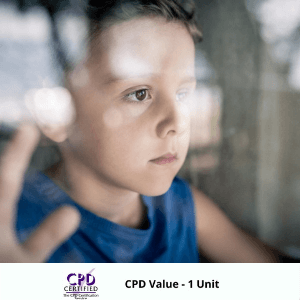Autism Awareness
Autism is a lifelong developmental disability that affects how a person communicates and relates to the people around them. According to the National Autistic Society, autism affects about 700,000 people in the United Kingdom. This equates to 1 in 100 of the population and the number of children being diagnosed with the condition is continuing to increase. In the UK, the National Autistic Society support and resource the parents and carers of autistic children. External support combined with training in autism awareness will help give parents and carers an understanding on how to plan to manage the condition.
Who is this course for?
This is an ideal introductory training for parents and those who work with children on the autistic spectrum. The course discusses during the diagnosis of autism, interventions and adaptations that can improve the child’s quality of life.
By the end of this course, you will
- understand what autism in children is and how it affects a child’s daily life.
- Know what factors contribute towards a child developing autism.
- understand some of the typical behaviour so you can provide effective support
- Know what happens during the diagnosis process.
- understand some of the intervention methods that can help manage the condition and
- learn about simple adaptations you can make to improve a child with autism day to day life
Autism Spectrum Disorder
There were lots of different ways that autism can affect individuals, and these can range from relatively mild conditions to quite severe and very noticeable impairments. The common factor and core idea is that the brain of someone with autism functions differently and receives and processes information in a different way than someone who does not have autism. It’s not yet known how or why autism occurs. However, scientists believe there to be certain factors that increase the likelihood of someone being diagnosed with ASD, which are explored in this training
Autism is one of five pervasive developmental disorders. All have commonalities in communication and social deficits, although each one differs in terms of severity. Symptoms are typically observed during the first three years of life. The five pervasive developmental disorders are autism, Asperger’s Syndrome, Rett Syndrome, childhood disintegrative disorder, CDD, and pervasive development disorder.
Testing and Support
The first step in a diagnosis is usually a visit to the GP or paediatrician to talk about concerns relating to the child’s development or behaviour. The GP will make the referral to a team who specialise in autism in children and who use interviews, observations and specific checklists for this purpose in order to identify the symptoms of autism.
This team of specialists will include neurologists, psychologists development paediatricians, learning consultants, and speech and language therapists. The first steps are to rule out intellectual disability, hearing impairments, behaviour disorders, or eccentric habits before moving on to an autism diagnosis.
Living with autism is not just about getting the right diagnosis. It’s also about offering the right ongoing help and support for that person. As someone working with or caring for someone with autism, there are things everyone can do to enable the child integrate with their surroundings, which are examined and discussed throughout this training.
| Course Content | Module |
| Definitions, Context & Background | 1 |
| Understanding Autism Spectrum Disorder | 2 |
| Diagnosing Autism Spectrum | 3 |
| Testing and Support | 4 |
Course Assessment
Online assessment for this autism awareness certification is carried out by a series of multiple choice questions. Candidates must answer 70% of the questions correctly to pass each module. We advise you to complete each module and answer the question before moving on to the next module. This provides a better learning experience because you will need to have knowledge from earlier modules to understand some of the material in the later modules. For those who complete the course successfully, a PDF certificate of the award is sent directly to your inbox. Hard copies of the award are available on request. The course takes 30 minutes of training to complete. This is course content only and does not cover the time it takes to answer questions.



